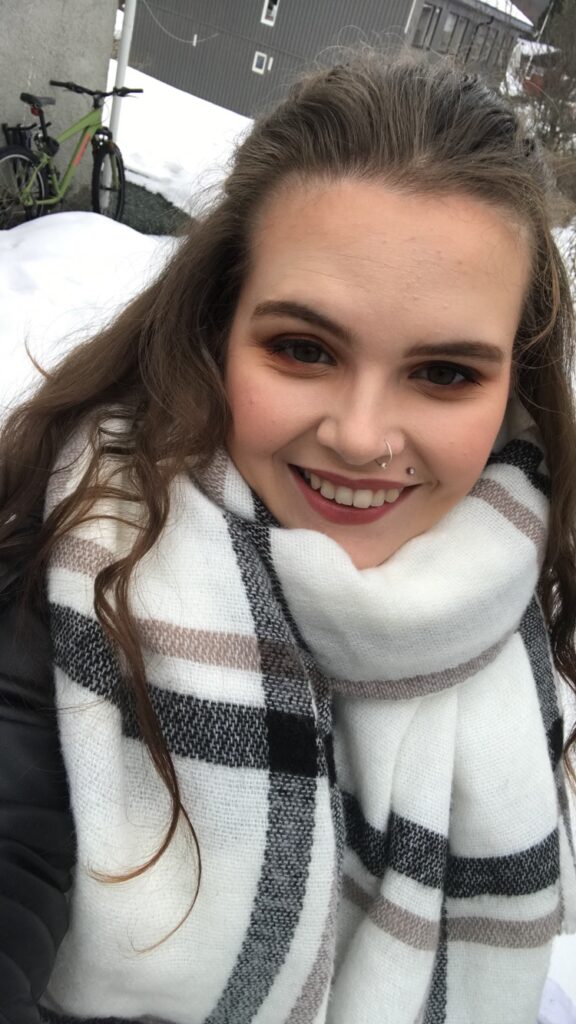
An investment for the future
Written by: Jeanett Hardersen
Header photo: Vincent Wachowiak, Unsplash
Published: Februar 13, 2024, 11:02 | Last modified: Februar 13, 2024, 11:02
What is the best recruitment strategy? Can we reduce the amount of ownerless fishing nets that just floats in the ocean? Is there a way to utilize fish remnants? How can we engage children to eat more fish?



First photo is of Ruth Utnes, project manager in Ungt Entreprenørskap Arktis (Young Entrepreneur Arctic). The second picture is of the announcement of the winner. The third photo is the winners of the grand finale. From left Ida Elise Midtlyng, Mathea Klo Jakobsen, Dina Eklund Thomassen and Frøya Weide. Hanna Rolness was not present when the photo was taken.
Photos: Ungt Entreprenørskap Arktis
From fish blood fertilizer to GPS trackers on fishing nets
Thinking about the future can seem terrifying. While technology is developing in a constantly speed, it appears that the world is facing more and more environmental problems. But whose responsibility is it, really? Is it the industry? The politicians? Society? There is no easy answer to this question, so to get closer to a possible solution, we need someone smart who sees the world in a different perspective. We need those who are the future.
Together with Nordlaks, Salaks, Northern Light Salmon As, Sørrollnesfisk As, Gratang Laks, and Kleiva fiskefarm, we challenged 400 middle school students in student enterprises from across Sør-Troms to come up with solutions to issues that the fishing and maritime industries face almost daily. We developed four issues in total, and the student enterprises could choose one of them to work with. They were also free to choose how far they wanted to develop their solution. Here is what they could choose between:
1.
How to get children to eat more fish
2.
Recruitment within the fishing and maritime industry
3.
Dealing with ghost fishing net
4.
Residual raw material from fish
After about six months of ideation, testing and participating in school finals, nine groups stood left ready to participate in the grand finale organized by Ungt Entreprenørskap Arktis (Young Entrepreneur Arctic) held in the Equinor building in Harstad. We in Polarkonsult are proud and humbled to be allowed to host the grand final. To judge the competition, we each had our representative, which consisted of the following people:
Monica Lundberg, Gratang Laks
Marianne Bendiksen, Northern Light Salmon As og Sørrollnesfisk
Tonje-Helen Gundersen, Salaks
Frode Eldevik, Polarkonsult
Nina Dons-Hansen, Group leader and municipal council leader in Høyre Harstad
Unfortunately, Marielle Tryggheim from Nordlaks and Hugo Olsen from Kleiva Fiskefarm was supposed to be a part of the judge, but due to the storm “Ingunn” it was difficult for them to travel to Harstad. Instead, we had the fantastic Nina Dons-Hansen from Høyre Harstad who could step in at very short notice.
Excitedly, the talented, creative, and skilled student enterprises presented their concepts to the jury. From GPS trackers on fishing nets, turning fish blood into blood fertilizers for animal feed, utilization of fish bones to make knobs on hairbrushes and toothpicks instead of using plastic, a cooking book for children focusing on fish recipes to mention a few.
Mio and Tio´s adventure - a cooking book for children with fish recipes
One of the student enterprises that truly impressed the jury with their idea was Fiskeeventyrerne EB, consisting of middle school students Ida Elise Midtlyng, Dina Eklund Thomassen, Mathea Klo Jakobsen, Frøya Weide, and Hanna Rolness from Kila Middle School in Harstad.
Their concept is to create a cooking book and cutlery for children and young people to inspire them to eat more fish. They used UN sustainable development goal No. 3, “good health and well-being,” and sustainable development goal No. 12, “responsible consumption and production.” The idea is to produce the cooking book in Norway to reduce carbon emissions and make it as locally produced as possible. To help encourage children eating more fish, they have created the characters Mio and Tio, who goes on adventures throughout the cooking book.
“
It might be because we recognized for example like having younger siblings. You can look at them and see the reason why they don´t want to eat fish because they are not used to it, and we should have become used to it earlier. That it is sort of a habit to ask what type of fish dish, or if you want to have fish for dinner. That it is rather common, and not seen as disgusting. – says Mathea Klo Jakobsen, Fiskeeventyrerne EB.
„
Fiskeeventyrerne EB wants the recipes in the cooking book to show children and young people that there is fish in the food, so they don’t feel deceived into eating food with fish in it. “You shouldn’t hide the fish. I know some are thinking of hiding the fish in another product, but then they won’t learn to like eating fish. You’re just hiding it. Then they won’t develop a habit, and they won’t eat fish when they’re older,” says Frøya Weide, Fiskeeventyrerne EB.
They all had good ideas for solving the issues in the fishing and maritime industries, including the idea from Fiskeeventyrerne EB. The judges were impressed by the amount of the work each student enterprises had put into their work.
“We are a Northern Norwegian industry. An industry that is crucial for the districts, Northern Norway, and for Norway. It is incredibly important to have the young people with us in the future. They are the ones who will take over. Those who enter this with fresh spirit and mind, and it is crucial to support them. Provide them with knowledge, guidance, and give them the opportunity to come up with such tasks like these. They do things differently than us, and that is incredibly valuable for us as an industry,” – says Marianne Bendiksen from Northern Light Salmon As. Tonje Gundersen from Salaks and Monica Lundberg from Gratang Laks agree with Bendiksen.
Blooming in different ways
As a company and industry, we have a significant responsibility to support, engage, and guide young students in the best possible way. To keep our business grow we need to recruit as many as possible. These young students are the ones to take over. They are the future. But where and how we connect with them?
If it weren’t for Ungt Entreprenørskap Arktis who arranges events like this, we most likely would never have met these students with these exact ideas. We could of course visit different schools in the region to connect with them, but the result would have been different.
Students who speak about what they find interesting and important will most likely be much more engaged in the current topic and probably learn more during the process than just listening to someone having a lecture about the same.
But how do we continue this?
“
What I think is the most important is that we politicians support initiatives like Ungt Entreprenørskap. That they actually get the opportunity to be established here in our region and can do such events in schools. Both in middle – and high schools, so that’s really the first thing we have to continue doing, allocating funds to it. – says Nina Dons-Hansen.
„
Politician Nina Dons-Hansen, group leader and municipal council leader in Høyre Harstad, adds that when she was in the Planning and Business Committee, they provided financial support to some student enterprises to help them further develop their product. Also being a part of the jury allows her to see what the students have been working with, have a completely different experience, and, not least, listen to them.
“I think it’s very important that young people get a different type of education. Being allowed to work creatively and think outside the box, that it’s not just the teacher standing here lecturing and teaching, and that they solve tasks as usual. I think it has tremendous value, and I don’t just think, but I know because I saw last year when Entrepreneurship Week was held, how incredibly great an effect it has on those who perhaps don’t blossom in other ways in class. They really get to utilize themselves in a better way when they have to solve such tasks like this. I think it’s very important for imagination, creativity, and interdisciplinary development.” – says Dons-Hansen.
A Northern Norwegian Determination
After the storm “Ingunn” and her fierce ravaging in Northern Norway, it was difficult to believe that the grand finale organized by Ungt Entreprenørskap Arktis would manage to take place on Friday, February 2nd. Canceled boats, closed roads, and complete chaos threatened the entire final.
“We met this hurricane called ‘Ingunn’ this week. It really hit the worst week it possible could. We’ve been working on this project for half a year now and have been looking forward to it so much. When we were supposed to have the kick-off on Monday, the boats were canceled, the roads closed, the bridges were closed, so neither jury members nor my colleagues could get to the city. Then I stood with four or five schools that were supposed to have a kick-off simultaneously, but fortunately, we have today’s technology that allowed us to bring all the students onto Teams,” – says project manager Ruth Utnes in Ungt Entreprenørskap Arktis.
Utnes adds that after the kick-off, she visited various schools in Harstad to help the student enterprises as much as possible, and that the teachers have been absolutely fantastic with all the work they have put into the project, as well as all the responsibility they have taken upon themself.
“
We were very unsure if we had to cancel, but we have incredible local people who jumped in, served as a jury, and took full control in some of the school finals. And we managed to hold some school finals earlier today, so we just barely made it. – says Utnes.
„
There is no doubt that many have worked as heroes to make this project happen. Both Utnes and her colleagues are very grateful for all the help they have received regarding this event. There are many ways we all can contribute in various ways. Maybe the important way is to continue motivate and recruit young students into the field, so they can be a part of the future solution.
In the meantime, we can work even more with how to recruit. One of the issues the judges presented to the students was about recruitment, and the jury thought it was interesting that none of the student enterprises that participated in the grand finale presented a solution to this issue. Maybe it tells us that the issue was not interesting or that we need to work harder to become an attractive workplace for these students when they are applying for jobs. Who knows? That is what we must figure out.
Thank you very much for a wonderful collaboration and an incredibly exciting day!
About Polarkonsult
Polarkonsult, based in Harstad, is a prominent consultancy specializing in innovative ship design and maritime engineering services. Since 1974, the company has cemented its position in the industry by combining advanced technology with sustainable principles, helping clients around the world navigate towards a greener future.
With a dedicated team of experienced engineers and designers, Polarkonsult strives to deliver solutions that not only meet but exceed customer expectations and current industrial standards. The company’s commitment to environmental responsibility is evident in their projects, like MV Vigdis H, which represents a new era of environmentally friendly ships that contribute to reducing the global carbon footprint.
Have a question for us?
If you do have any questions regarding the article feel free to send them a message, or use our contact scheme.





